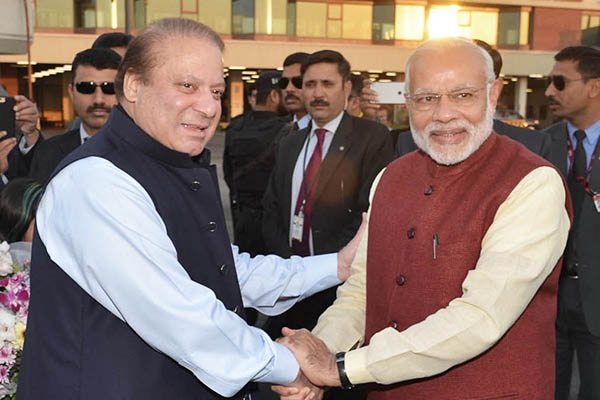
Courtesy PID
Regional observers praise gesture as positive step toward normalizing ties between neighboring nations.
Indian Prime Minister Narendra Modi made a surprise “goodwill” visit to rival Pakistan on Friday, with the first such trip in a decade seen as a step toward normalizing ties between the neighbors.
Modi, who announced the trip via Twitter while in Kabul, met in Lahore with his Pakistani counterpart Nawaz Sharif, who was celebrating his birthday and the wedding of a granddaughter, for a two-and-a-half hour visit seen by analysts as a positive step.
A meeting of their top diplomats is now set for January in Islamabad, indicating a potential thaw in ties between two countries that have fought three wars, along with countless close calls, since gaining independence from Britain in 1947.
Television footage showed an Indian Air Force jumbo jet land at Lahore’s Allama Iqbal International Airport in the late afternoon on Friday, moments after Sharif himself arrived by helicopter. The Pakistani premier, flanked by cabinet ministers, received Modi on the tarmac where military officers lined up along a red carpet. Both leaders wore their national dress and made their way to Sharif’s helicopter, which flew them to the Pakistani leader’s residence south of the city. They were seen smiling as they walked alongside each other and chatted in Sharif’s living room. Shortly thereafter, Modi was seen off by Sharif at the airport.
Pakistan’s Foreign Secretary Aizaz Ahmad Chaudhry later told a news conference that it was a “purely goodwill visit.”
“Both leaders agreed that it was extremely important that the leaders of both countries should understand each other’s point of view so that the doors of prosperity could open for their people,” Chaudhry said. He said Modi gave Sharif birthday greetings and the meeting took place in a “cordial atmosphere,” and added that the two countries’ foreign secretaries will meet in Islamabad next month.
Senior Indian officials and politicians also spoke positively of the meeting, with foreign ministry spokesman Vikas Swarup tweeting that the meeting had set a “positive spirit in the neighborhood.” Foreign Minister Sushma Swaraj, meanwhile, tweeted: “Neighbors’ relations should be like this.”
The last visit to Pakistan by an Indian prime minister was in 2004 by then leader Atal Bihari Vajpayee, who is credited with bringing about a thaw in relations with Islamabad. Modi and Sharif have had a stop-start diplomatic relationship since the Indian premier’s surprise invitation to Sharif to his inauguration in May 2014.
Initial optimism about a revival of ties was short-lived as the two countries traded heavy fire across their disputed border in the Himalayan territory of Kashmir, which claimed dozens of lives on both sides. But this month, they agreed to resume high-level talks that would cover peace and security as well as territorial disputes, including over Kashmir.
A brief meeting on Nov. 30 between the two leaders on the sidelines of the U.N. climate summit in Paris, followed by talks between the two countries’ national security advisers in Bangkok, appeared to have broken the ice. It was unclear, however, when Modi’s visit itself was planned. And though officials have remained tight-lipped about the agenda, the meeting was hailed by regional observers.
“It’s an extremely welcome move and it shows that the baby steps promised at the Paris summit between the two prime ministers have transformed into a much bigger step, which holds big promise for both countries,” said Imtiaz Gul, head of the Islamabad-based Center for Research and Security Studies.
Earlier Friday, in a speech to the Afghan parliament, Modi urged closer cooperation between India, Pakistan and other neighbors over Afghanistan. He also made a veiled reference to Pakistan on the issue of cross-border terrorism in Afghanistan.
“Afghanistan will succeed only when terrorism no longer flows across the border, when nurseries and sanctuaries of terrorism are shut, and their patrons are no longer in business,” Modi said.
India’s main opposition Congress party, however, was quick to criticize Modi’s “irresponsible” decision.
In Pakistan, opposition senator Sherry Rehman said that while most Pakistanis backed better ties, parliament had not been consulted and it was unclear what concessions Islamabad was ready to make. “It’s a small step because we don’t know what kind of sustainable progress is based around it. We don’t know if this is more than a grand gesture,” she told AFP.
